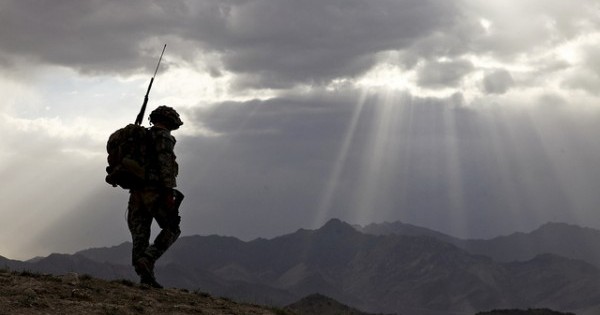
WARDAK — It is after 2 a.m. and the soldier’s voice breaks in a large gray room. A few men sit near him at computer terminals or makeshift plywood phone booths, but he no longer cares who is listening. He slumps over the table and presses the phone to his ear. With a finger he traces names and numbers carved into the wood by countless other soldiers.
“You’re destroying my trust in you,” he says. “Just like the first time I fucking left.”
On the other end of the line a girlfriend, or a wife, considers her response. I try to imagine her, where she is, which version of America is home. A military town perhaps, its neighborhoods emptied of men. There is the surrounding sprawl, a commercial road lined with car dealerships, tattoo parlors, strip clubs. A woman left behind on such a landscape, again. For her, it is the middle of the afternoon.
At this hour, in Afghanistan, the recreation room is not full but far from empty. There is a clatter of keyboards, the scrape of heavy chairs, conversations overheard in halves. Nearly every base has such a room, and here troops and contractors gather to shrug off the war for a while and call or write home with communal phones and computers. They place their rifles or machine guns on the floor and sit side by side at carrels stained with ink and sweat.
All sound is amplified. I have heard laughter and professions of love in these rooms, proud fathers baby-talking over Skype to stunned, pixelated infants. I have also heard unhappy lovers and divorcing parents, couples arguing over lawyers’ fees or stepfathers furious at the conduct of another man’s children. Here young men argue with women who’ve hurt them, and try to reason with women they’ve already lost. It is not all this way, but it is what you remember.
For a while I collect pieces of dialogue in notebooks and on scraps of paper. A script that continues at every base I visit.
“What?! Baby, I swear … I never talked to her.”
Men are the loudest, airing everything. I never hear female troops quarreling, though I have seen them weep.
“It’s cause you got so many things to hide. When you gonna come clean?”
Most of the problems are common, even mundane. But through war and distance they mutate, like waves gathering strength on the long roll across the sea.
“You two always fight and it fucking annoys me. You can’t even decide who’s coming to the airport to get me.”
Years ago I tried keeping a relationship alive over great distance. I remember how things that had seemed certain became vague, unrecognizable. The vacuum of silence, how easily it was filled by my imagination and never with good things. But when I hung up that phone, slick with the grease of many other hands, many ears, my fighting was finished.
“Are you serious? Why don’t you fucking listen to me? I can’t believe this shit.”
Mostly, the soldiers hold their voices low, though sometimes they shout in rage and helplessness. Some nights I hear lives disintegrating. The heartbreak is very near. If it is bad and loud, if a solider is screaming at his wife, others in the room will lift their heads for a moment, then fall back into their emails.
“You don’t think you did anything wrong? How THE FUCK is that not wrong?”
No one ever interferes or approaches. Men who are new may look up in irritation, as though emotions were an illness that might be transmitted. But even they say nothing. In time they learn not to hear.
“Because I don’t want to let you hurt me no more.”
By 3 a.m., in the large gray room, the young soldier is still slumped by the phone, still picking at scarred plywood. His voice is hoarse, and he has no answers.
Outside, the late-night patrols are preparing to leave the base and search the roads again for IEDs. Massive armored trucks fitted with mine-sweeping equipment sit grumbling in the darkness. Their crews gather around, drinking coffee and smoking, like the drivers of snowplows before a storm.
The soldier speaks to the woman at home: “Yeah? Well now you know how it fucking feels.”
He slams down the receiver and picks up his rifle and he wanders back out into the war.

